
Sahira Q, formerly known as Dixie Que, is a drag queen from Ontario, Canada. Trend-setting and innovating in the town of Peterborough, Sahira Q started the Haus of Accountants; the drag sisterhood performs in different venues several times a month. Sahira Q promotes love and the sisterhood of drag along with a gothic pink style.
@HausofAccounting Drag Queen. Graphic Designer. Ontarian Socialite Facebook ~ Instagram
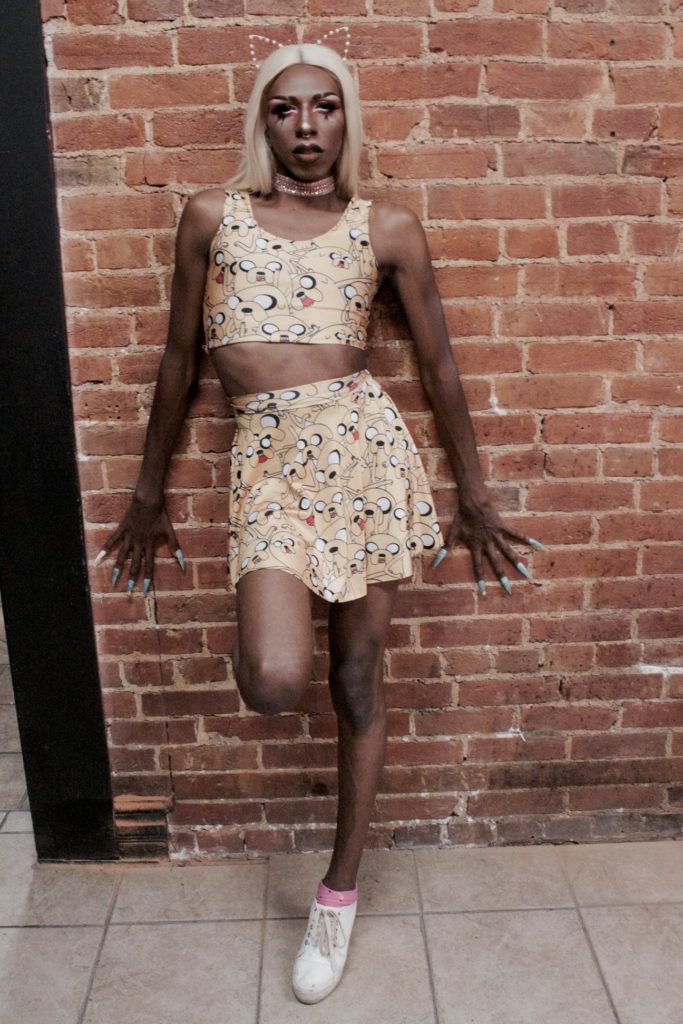
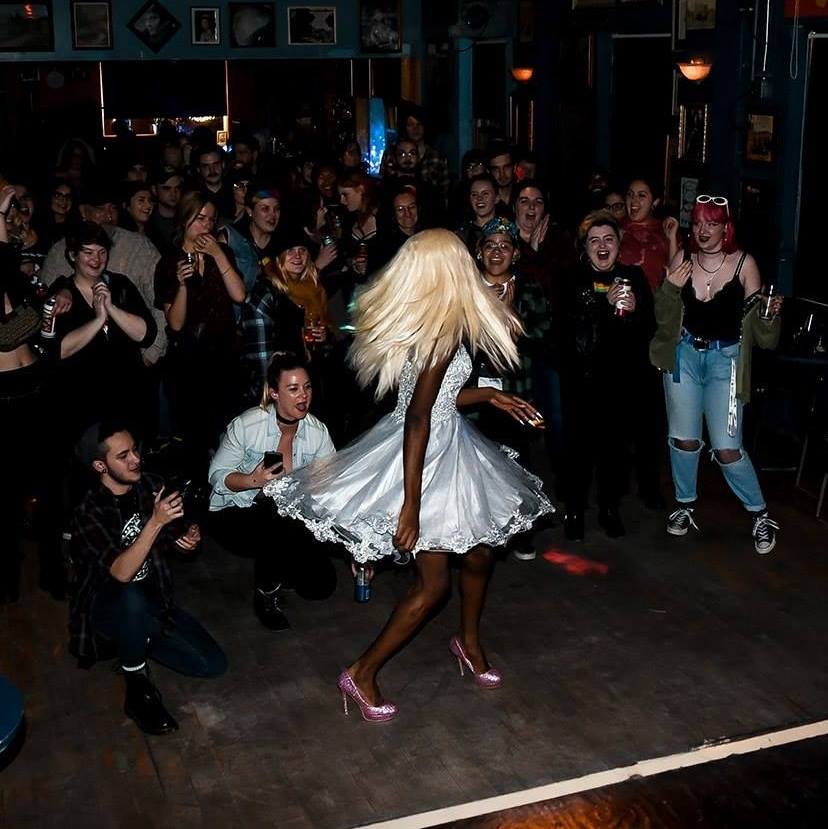
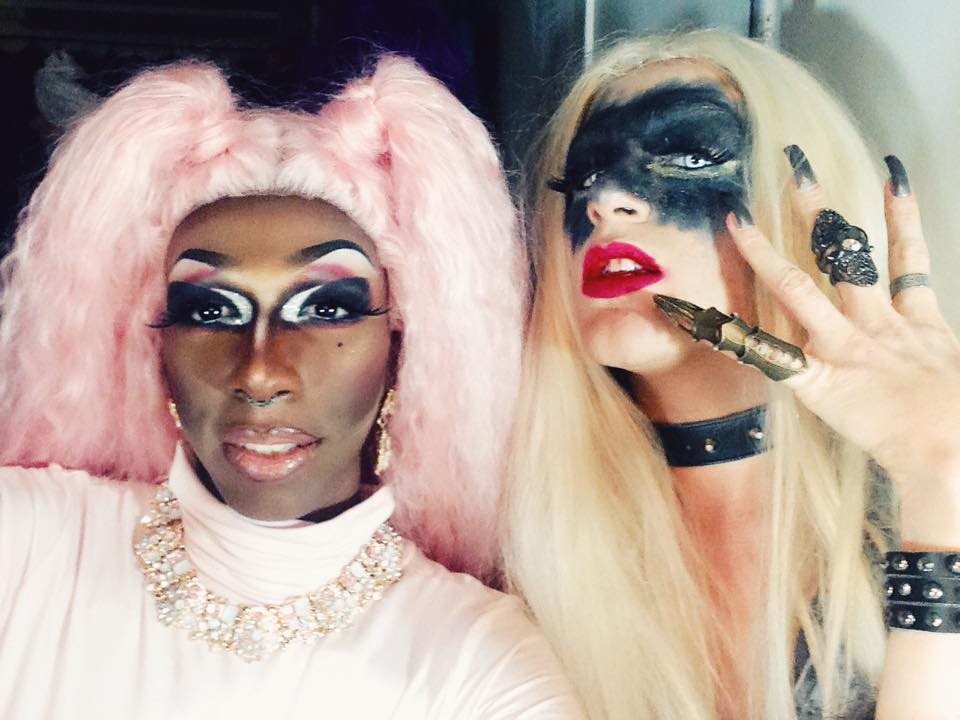
“Thanks Opal Essence for this wig!! My look was everything. Thanks to everyone who came out and helped put together our “little” show. Thanks to Quxxn The Drag Queen and Janis From Accounting. Biggest thanks goes to our momager Diana Stephens. “
Sahira Q — with Keidis Emmerson-Mears. November 1st, 2018
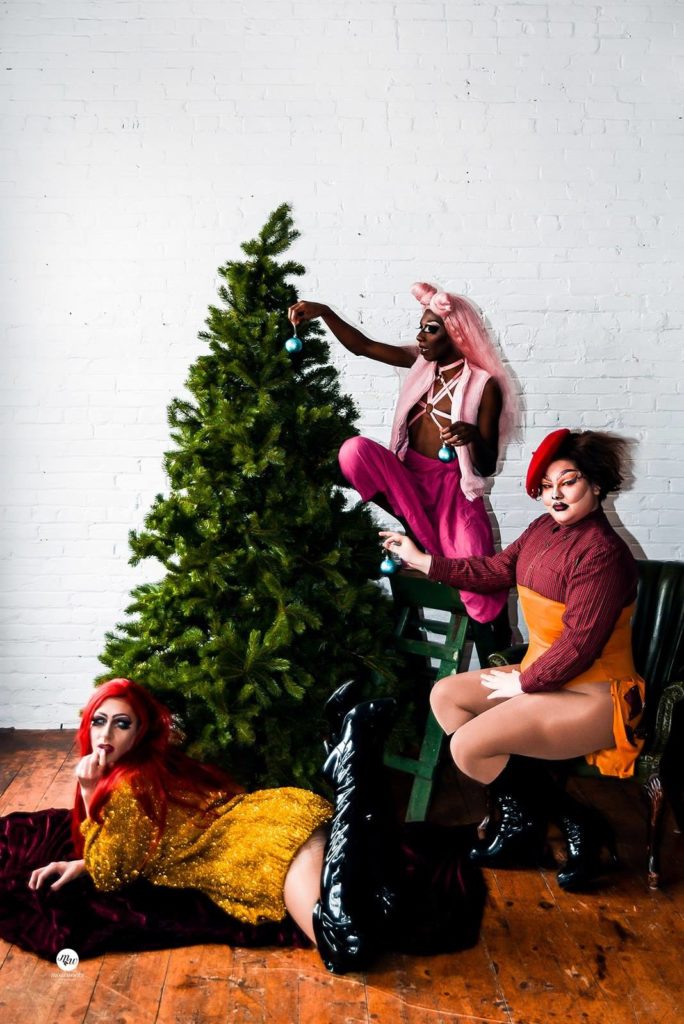
📸: MossWorks Photography Samantha Moss — with Quxxn Delacore and Janis From Accounting. December 12, 2018
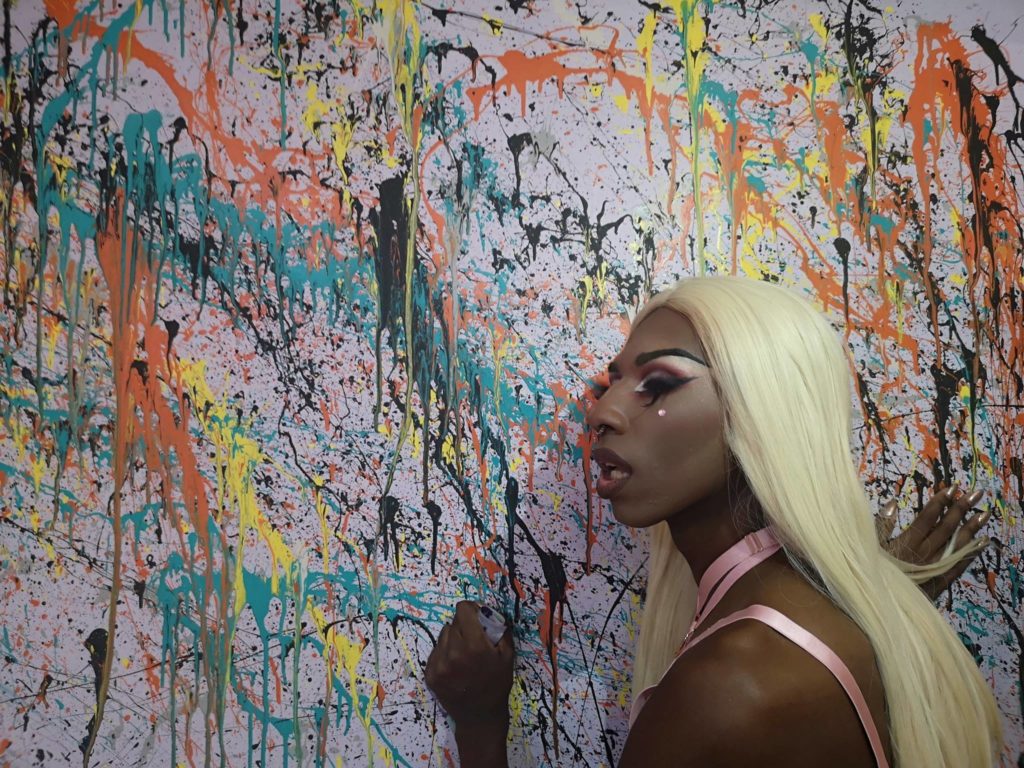
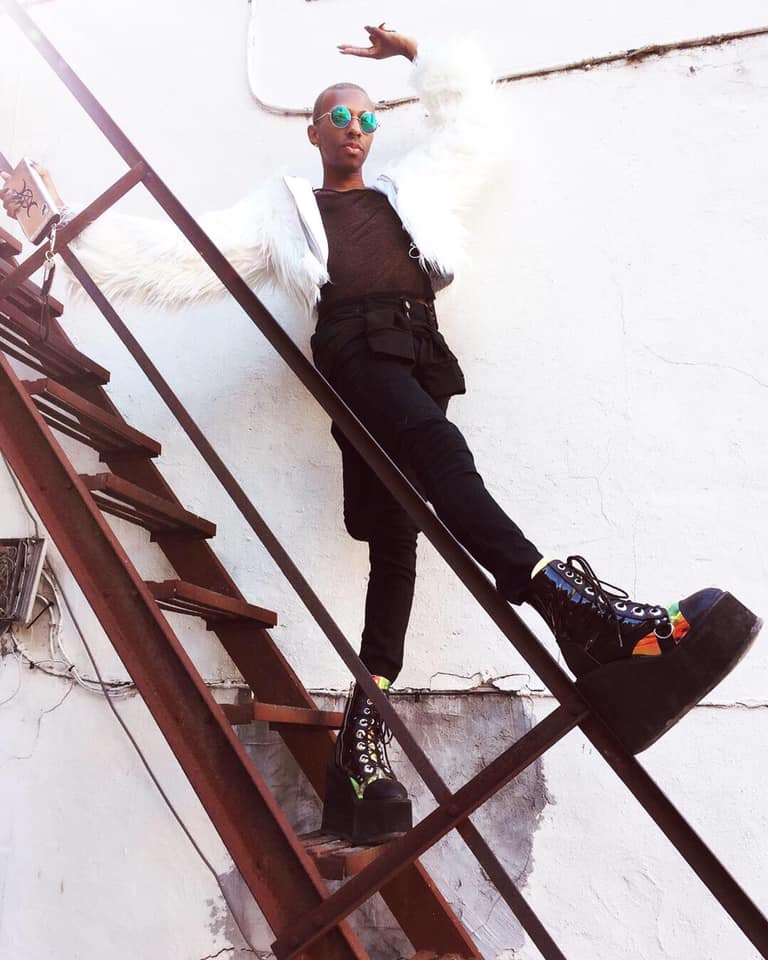
(All transcripts refer to “Dixie Que” as opposed to “Sahira Q”)
Transcription of above micro-podcast:
Interviewer: Here is Dixie Que as she talks about how drag creates a space that promotes love with her drag artistry and believes drag to be inherently political in her community.
Interviewer: Yeah. I like that idea. Do you consider your drag political?
Dixie Que: Definitely. Oh yeah. Are you kidding? How somebody steps out of their house and anything other than, it’s political. You are making a choice by doing that, right? You’re making a statement, telling everyone around you that it’s okay to be this way. To be whatever the heck and yeah, it’s definitely political. You’re creating a space too. A space for like other people to be like comfortable; to be themselves. Which is super powerful.
Interviewer: I agree. And the things they can do in those spaces are amazing.
Dixie Que: Exactly. Usually it’s like, you’re spreading the message of love. Which is like, come on. Haha.
Interviewer: Yeah
Dixie Que: That’s the way to fight hate. Interviewer: For sure. For sure
Interviewer: Dixie started her own drag family and she describes her experience of a sisterhood.
Dixie Que: Ah, yes. So, I umm currently live in Peterborough and last summer, in July, I started my own drag family. All because of a cousin. Um. It’s crazy because were all big personality types, but like, were all like misfits and that’s all we have than like other homes or regular homes. But it’s good to have backing of a sisterhood of supportive families. To always fall back on. Yeah.
Interviewer: That’s awesome. What is it called again? I didn’t catch it, I’m sorry.
Dixie Que: House of Accountants.
Interviewer: Accountants?
Dixie Que: Yeah, haha. Interviewer: Wow, I like that.
Interview with Dixie Que
To cite this please use the following:
Temko, Ezra. 2020. Student interview with Dixie Que. Sociology of Drag. April 29, 2019.
Audio available at https://ezratemko.com/drag/dixie-q-said-jiddawy/
Dixie Que: Can you hear me?
Interviewer: I can hear you. Yes.
Dixie Que: I can hear you, too.
Interviewer: How are you?
Dixie Que: I’m good, how are you
Interviewer: I’m good. I’m Liz
Dixie Que: Hi, I’m Said.
Interviewer: Nice to meet you. I’m going to record you is that okay?
Dixie Que: Yeah that’s fine.
Interviewer: Okay. Umm. Alright. So, its ah nice to meet you and get to have this opportunity with you. I really appreciate it. Umm, I gotta a couple of questions for you. And just however you want to answer them is good. Kind of like nothing is off limits. Whatever you want to say will be good. Alright, when did you first hear about drag and what was your initial reaction to it?
Dixie Que: Umm so I probably first heard about drag. I don’t know it would have been like when I was 16 or something like that. Umm I probably, think remember going out with like my family or something and they were like here’s this dive bar. So, we went in and I saw it and I thought oh so that’s cool and interesting. Umm I was really intrigued by like how people, just like, did what they wanted without societies expectations and repercussions. And it was really cool because it was an expression of art. I really, I guess really connected to that. Is that your puppy?
Interviewer: That’s cool. I’ve been to a couple drag umm bars and I love the experience every time. I have a little girl and I had my mom babysit and I’m like, okay Mom, I’m gonna go to the drag bar and she’s like “oh you’ll have to tell me all about it.”
Dixie Que: Yeah, it’s so fun because like there’s always like a vibe of love in the air you feel every time you go. And for me, that’s what I saw and felt like.
Interviewer: I like that. When did you start performing as a drag artist?
Dixie Que: Well I started performing about three years ago.
Interviewer: And why? Why did you transition from just the observer to the participant?
Dixie Que: Umm it’s kind of happened slowly but like, I don’t know. I feel like the natural drag sideline is like I had it for Halloween or something and then it just kind of started. But for me it wasn’t that. It was actually like an amateur night and I wanted to be like go and have fun, so I did. I like had so much fun that I just wanted to keep doing it.
Interviewer: That’s cool. How do your friends, family and other people think about you being a drag artist?
Dixie Que: So, my chosen family is super supportive. My friends are super supportive and like my gay rights community is super supportive. I would say my biological family is not so much as supportive as other things. For them they don’t quite understand it. So, people tend to fear what they don’t understand.
Interviewer: That’s, that’s rough too.
Dixie Que: Mhmm.
Interviewer: Where did, what’s your drag name.
Dixie Que: I’m Dixie Que.
Interviewer: And where did that come from?
Dixie Que: Okay so it’s kind of a weird story, So Dixie ah just means bad in German. So that’s where I got that from. And then I just needed a last name. So, I kind of went with Q because I figured it represents queer, queen, and questioning all these things.
Interviewer: Yeah, I like that. That’s good. There are a lot of terms and styles of drag. So where does, what’s your inspiration, what kind of drag do you do?
Dixie Que: I would say I do like punk drag. Cuz, I don’t like to adhere to the goal per say. Umm my aesthetic currently is super pink. I like love pink things and anything gothy and vintage. Like I have huge pants and large platform boots that are like, leather. It’s so much fun to wear.
Interviewer: Oh nice.
Dixie Que: Yeah. My inspiration comes from essentially like the things in the regular day to day life. So, like I love Stephen King novels, love horrors, stuff like that. I listen to a lot of like weird music like psychedelics and like that. That’s where I would say like my inspiration comes from.
Interviewer: Cool.
Dixie Que: Yeah
Interviewer: The drag show that I went to was umm Island of Misfit Boys. It was like a punk like rock show.
Dixie Que: That’s so cool. Yeah, I love that. I love that kind of stuff.
Interviewer: Oh yeah it was great. My dogs barking, I’m sorry.
Dixie Que: Aw. What’s your dog’s name?
Interviewer: She thinks she’s a queen too, haha. Uh, so who influenced you in drag. Or like any?
Dixie Que: So, obviously like umm because of RuPaul’s drag race and stuff like that. Those are big names that have influenced me because they are so popular and out there like. Local queens because I grew up in Toronto. So local queens have influenced me as well. Umm, yeah those are really like my only inspirations. So that’s about me that I knew at the time. But I feel like that drag is more mainstream and we have the Internet to like connect us to like seek more and see more. I just every time I see something, I like I just like save it, the idea or whatever and I’ll reinterpret it into my own version of it.
Interviewer: That’s great.
Dixie Que: Mhmm.
Interviewer: We are watching umm RuPaul’s drag race in our class right now that I’m taking.
Dixie Que: Oh yeah.
Interviewer: We watched all of Season 9 and so were getting ready to watch Sasha Velour you know win the whole thing.
Dixie Que: Oh my god, nice. It’s so good. Yeah Sasha is a huge inspiration for me for sure. I love her like weird quirkiness. I love that. It’s cool because like she does this thing that combines being pretty as well as the weirdness into like a perfect harmony.
Interviewer: I like that.
Dixie Que: Mhmm.
Interviewer: I like that she brings this creative, like artistic, thing that’s a little bit different from what everyone else kind of you know.
Dixie Que: Mhmm.
Interviewer: Kind of more.
Dixie Que: You can tell she’s intelligent too. You can tell there is thinking behind everything she does.
Interviewer: Yeah. I like that idea. Do you consider your drag political?
Dixie Que: Definitely. Oh yeah. Are you kidding? How somebody steps out of their house and anything other than, it’s political. You are making a choice by doing that, right? You’re making a statement, telling everyone around you that it’s okay to be this way. To be whatever the heck and yeah, it’s definitely political. You’re creating a space too. A space for like other people to be like comfortable; to be themselves. Which is super powerful.
Interviewer: I agree. And the things they can do in those spaces are amazing.
Dixie Que: Exactly. Usually it’s like, you’re spreading the message of love. Which is like, come on. Haha.
Interviewer: Yeah
Dixie Que: That’s the way to fight hate.
Interviewer: For sure. For sure. Can you talk about what your life is like as a drag artist? Are you a part of a drag family, collective, or something?
Dixie Que: Ah, yes. So, I umm currently live in Peterborough and last summer, in July, I started my own drag family. All because of a cousin. Um. It’s crazy because were all big personality types, but like, were all like misfits and that’s all we have than like other homes or regular homes. But it’s good to have backing of a sisterhood of supportive families. To always fall back on. Yeah.
Interviewer: That’s awesome. What is it called again? I didn’t catch it, I’m sorry.
Dixie Que: House of Accountants.
Interviewer: Accountants?
Dixie Que: Yeah, haha.
Interviewer: Wow, I like that. That’s cool. How often do you guys perform then?
Dixie Que: Ah. I would say like twice a month we have events. Yeah.
Interviewer: Do you perform in the same spot or different place?
Dixie Que: Different spots. And then if like we like. We like travel a lot. So, like, there is an event happening somewhere else and we are asked to perform or are out like that. In town, we have like have a specific bar that we are known to frequent.
Interviewer: Okay.
Dixie Que: Yeah.
Interviewer: And how many people do you have?
Dixie Que: Currently we are at four. There is four of us.
Interviewer: Okay. Alright. What goes into getting ready for performance?
Dixie Que: Umm. So much. So many things. So, for me because I’m always like the person behind the curtain, like calling all the shots. I have to book the venue, get the DJ, print out posters, design the poster. I also do the graphic designs. Make the Facebook event page, invite people and make sure people know about that event and that it’s happening. On the day of, get ready, prepare songs, learn the routines, and then you perform. Make sure everyone is being safe, sober and alive. And then after the fact, pay everyone so that we can keep it going.
Interviewer: Oh. That’s a lot. What goes into just your performance and you?
Dixie Que: Umm. For my own performance I love being like an aesthetic queen so I always spend at least two days before I am. Just making sure all my looks are perfected and then I will choreograph my numbers and run them through. Then be ready to perform them.
Interviewer: Wow. Two days huh?
Dixie Que: Yeah cause I have actual life things going on. Otherwise.
Interviewer: Haha. I know. I know. You like you have your job, and then you have life and things.
Dixie Que: Yes, exactly. You, it’s like the layers of like, things happening.
Interviewer: What are the biggest challenges of drag and being a drag queen. Or drag artist, I mean.
Dixie Que: Umm. I feel, that okay, so I feel like the biggest challenge is always, be like you are underappreciated and undervalued. People don’t realize how much work goes into it cuz they don’t see the behind the scenes. They only see like the three minutes you’re on stage. Right? And they applaud and that was amazing three minutes. But like, kay that was like two weeks’ worth of preparation.
Interviewer: Yeah, haha. That’s crazy. We’ve done a lot of you know restaurant kind of business in my life and you know you spend a couple of minutes or you know at night a couple of hours going to this event. There is so much planning that’s involved in it. Its…
Dixie Que: Its wild. I feel like in all theater, any form of theater production there is so much happening back stage. And there is always hiccups happening that people don’t see. But like people don’t know that and they don’t need to know that, haha.
Interviewer: Right. You’re trying to hold it all together for them, aren’t you?
Dixie Que: Exactly. The show must go on.
Interviewer: Hahahaha. Is there anything unique to the drag scene where you live compared to other places that you’ve known about the drag culture there?
Dixie Que: Umm. The, I would guess that there wasn’t one before me. Haha. There was one or like a few queens here, but they only did bingo nights. Not so much performance nights and then after I showed up and I like got this club started.
Interviewer: That’s awesome.
Dixie Que: Yeah, exactly things are like actually happening.
Interviewer: Wow.
Dixie Que: Mhmm.
Interviewer: And where are you from?
Dixie Que: Well I’m from Toronto but I currently live in Peterborough.
Interviewer: That’s like an amazing like feat to be able to organize that in your area.
Dixie Que: It needed something like. It was already so much art things happening here but like, I’m like “No drag? What the heck?”
Interviewer: Yeah. Cool. How do you identify in terms of your sex, gender identity, and gender expression out of drag?
Dixie Que: So out of drag, I am gender fluid. I use they/them pronouns and I would say I’m queer because I am attracted to all human beings no matter how they identify.
Interviewer: Alright. How has your sex and gender identities influenced your drag?
Dixie Que: I feel like it’s the other way around. My drag has influenced who I am as a [inaudible] because I think before drag, I was more limited. Or I limited myself to who I was but then after drag I found this newfound freedom because I could accept myself in different ways.
Interviewer: Yeah
Dixie Que: And then in a way, it freed me from this idea that I had in my head of like the binary. And how one person is allowed to be and live their life. But now I know it’s the other way around. My drag is how I see myself for sure.
Interviewer: That’s awesome.
Dixie Que: It’s like.
Interviewer: Go ahead.
Dixie Que: Sorry, I was just going to say it’s just like I feel like before I was always putting myself in boxes. And then now I realize there is no box.
Interviewer: Yeah.
Dixie Que: You know what I mean?
Interviewer: Yeah. I see that when we were watching the show and so I’ve done kind of some more research into that. And I think that it’s amazing how it gives people and you know before I took this class I didn’t really, you know how I went to shows but I really didn’t know what that did for people. And then I learned that there was this whole other world to what drag was doing for people that I had knew nothing about. It’s amazing how it is freeing and the other world of like drag kinging too. How these you know women are experiencing this other thing as well as. It’s, it’s just.
Dixie Que: And it goes even further with like people, like bioqueens, like women dressing up as drag queens.
Interviewer: Yeah
Dixie Que: Or like you know; it goes so much further, and for me it goes beyond gender and sex. It’s art. You’re just, like you have an idea and want to express it and you go wild. Go bananas, put on her mask and be crazy.
Interviewer: Haha. That’s awesome. I love it. So how has the drag impacted or changed your life then?
Dixie Que: Umm, I have like zero living room now because like everywhere you look there is like a wig or dress or something, haha but.
Interviewer: Hehe.
Dixie Que: But, umm I love it. Like I would not give it up for anything. It is so much fun. And I like take all the negatives with all the positives. I know that I’m doing more good than I’m experiencing, so that’s good for sure.
Interviewer: Do you have a lot of negative experience?
Dixie Que: Uh, no not a lot. But there’s definitely that. They exist, for sure. I feel like, that’s what I mean there’s like 95% is good, there’s a 5% bad.
Interviewer: Yeah.
Dixie Que: But there is such an overwhelming goodness that you like kinda overlook that.
Interviewer: That’s great to be optimistic like that. Some people let that 5% drag them down, that’s great you’re not, you know.
Dixie Que: You’ve gotta like, remind yourself, that, that’s all, like you could be having a bad day. I’ve had bad days in the past and I’ve got through those.
Interviewer: Right. I wish more people felt like that. Has drag impacted your confidence as a person when you are out of drag?
Dixie Que: Ten million percent, haha. Um, definitely. For sure. I feel like it, like, Dixie Que carries on with me even though I’m out of drag. Definitely, she’s still there somewhere underneath the surface.
Interviewer: That’s awesome.
Dixie Que: Yeah.
Interviewer: If you could go back in time as a drag queen. What advice would you give to your younger self?
Dixie Que: Umm. Be fearless and don’t be afraid to look like an idiot, haha. Cause like, just have fun. Don’t be afraid to look like an idiot, yeah. That’s good advice.
Interviewer: What is your show like that you do? Do you do lip syncing, do you do dance. Is it more like an artistic, kind of?
Dixie Que: So, in our house. Each of us has like something different. Umm, I specifically dance up and down queen. One of our house members, she’s a comedy queen. So, her songs are inter-cut with funny skits or like horror movie quotes or something like that.
Interviewer: Yeah
Dixie Que: Each of us does something a little bit different.
Interviewer: Awesome.
Dixie Que: One of the performers, she’s a hooper. So, she like has hoops and lights them on fire and stuff like that. Various circus acts. Yeah.
Interviewer: Wow.
Dixie Que: Mhmm.
Interviewer: Wow, that’s kinda crazy. I’m curious, if and how your social identities have impacted your experience of drag or vice versa. How your drag has impacted your identity. Can you share about one or more of your social identities that like gender, race, class, or where you are located at that has like an association with the drag that you do?
Dixie Que: Um. So, in a way, I feel like. Okay I feel like this is specific because I live in a kind of a small town.
Interviewer: Mmkay.
Dixie Que: Umm. Cause you know everyone, and everyone knows you. Especially if you end up like performing and everyone comes to the shows. So, when I’m out of drag, it’s still like I carry on this like notion that everyone knows me and like who I am or whatever. Um, where as I feel like that if you are in a bigger city, I don’t know if that would be the same. My social identity that has changed essentially in that sense, would be like, just like the skillfulness of it all. And people like knowing, like, I don’t know what I’m trying to say. Like, okay if I went out like right now like this, looking like this. I would still have the same response as if I went out in full drag.
Interviewer: Okay.
Dixie Que: Because I do drag.
Interviewer: And they know you.
Dixie Que: You know what I mean.
Interviewer: Yeah
Dixie Que: Yeah. Yeah, yeah, yeah.
Interviewer: I live in a small town too. And I live in a town of like 7,000 people.
Dixie Que: Wow.
Interviewer: And that’s with the prison that we have here too. They include them in the population. So.
Dixie Que: That’s wild.
Interviewer: It’s really smaller than that even. Um, but I’m only like an hour away from St. Louis, Missouri. So, I do all my interaction there and I wouldn’t know those people on the street, you know. If I see a show but I wouldn’t be able to recognize them.
Dixie Que: But that’s out of drag, yeah.
Interviewer: But here if I were to dress up and perform. Um people would totally know me at Wal-Mart, hehe.
Dixie Que: Exactly, yes.
Interviewer: I totally understand that experience right here.
Dixie Que: Yeah, yeah, yeah.
Interviewer: How do you define drag?
Dixie Que: Um. For me everything is drag. Like it’s putting on an outfit, putting on this like mask of how you want others to perceive you. Or how you want others to not perceive you. That’s what drag is to me. Yeah.
Interviewer: All that. What do you think the purpose of drag is?
Dixie Que: Um, to explore the different like, avenues that you have inside of yourself. Yeah like I don’t know. Today I’m feeling gothy so like I’ll explore that avenue and like create something gothy. Today I’m feeling feminine. Put on something feminine and explore that avenue. Eventually you get to express yourself and the different versions that exist of yourself and the possibilities are endless.
Interviewer: I really like that. That’s amazing. Do you think drag is sexual?
Dixie Que: It can be for sure. But I don’t think inherently that it is, yeah.
Interviewer: Is it for you?
Dixie Que: Is it, sorry…sexual?
Interviewer: Is your drag, like do you incorporate a sexual thing into your dance.
Dixie Que: Yes and no. Yes and no. I think it depends on the kind of number I’m doing.
Interviewer: Yeah.
Dixie Que: Uh, I just did, recently did a number that, umm. I did it to Marina and the Diamonds song, Savages. And I did like an angel look that transformed in a devil look.
Interviewer: Okay.
Dixie Que: And the whole number was just about how people underneath, you know like the whole philosophy theory altruistic love. It’s just like I was arguing the opposite and that’s all that number was about. It had nothing sexual to do with it either. But then as the number went on, I’m stripping on stage. That’s purely just sexual. So, it’s a yes and no answer.
Interviewer: So, do you like it in that response out of the crowd then?
Dixie Que: Well of course, haha. I’m a Leo so yes, haha.
Interviewer: So, you like RuPaul’s drag race then? You mentioned that earlier and that’s kind of like a large part of what we have been focusing on in our class. So, do you like appreciate him and the things it focuses on?
Dixie Que: I appreciate what the show is doing for the drag community. But I don’t necessarily admire RuPaul, himself. He’s problematic, because he’s done some problematic things in the past. And that’s like, pretty sure he’s what like 67 or some shit like that, haha.
Interviewer: Haha, yeah. He’s old.
Dixie Que: He’s old as dirt. So, it only makes sense that his ideals would be a little ancient as well.
Interviewer: That’s true.
Dixie Que: But um, but I really admire what the show has been doing because it’s bringing drag queens into the mainstream and its giving all these all these different kinds of folks who expect the art on television. To show people that drag isn’t one thing. It’s just not one way of being.
Interviewer: It’s got all these different things going on with it.
Dixie Que: Mhmm.
Interviewer: What do you think are some misconceptions that people have about drag?
Dixie Que: So, I feel like a huge misconception is that people always confuse drag and like people who are trans. Although they might overlap it’s not one in the same thing. Yeah, I feel like that’s a huge misconception.
Interviewer: Alright. I had actually never really known about um drag kinging or bioqueens whenever we came into it. Of course, everybody has heard about the baseline drag stuff, but I really thought it was interesting too. I even been to a couple drag queen shows and I had never seen a drag king and then I went to one a little while back and there that’s all it was. And I thought oh how things have changed. You know, where we’re incorporating, even now these kind of different things into it.
Dixie Que: I think that’s the other thing you said. People, that’s a huge misconception that like people always think that only gay men can only do drag or whatever. When in reality anyone can do drag and like you can be like whatever the fuck and do drag.
Interviewer: Uh yeah, I agree. If you could choose one thing for people to learn about drag, what would it be?
Dixie Que: Um, I would say go to a show, haha. And then you’ll learn everything you need to know. Yeah, like learn that it’s not about what people think it is. Haha, I feel like people always have, are thinking about that it’s something else entirely. Just go to a show its fun, haha.
Interviewer: I like that. Now I mean, what can you learn from better than experience.
Dixie Que: Experience, yeah. It’s about having fun and spreading love.
Interviewer: Well said. Anything else that you wanna add or that you think needs to be said out there.
Dixie Que: Uh, no nothing that I can think of.
Interviewer: No?
Dixie Que: No.
Interviewer: I really appreciate you talking to me today.
Dixie Que: Yeah, thank you for.
Interviewer: And all of the things you had to say. I’m going to…
Dixie Que: You’re welcome. I’m sorry what was this for?
Interviewer: This, so this is for. I’m taking this class at SIUE.
Dixie Que: Okay.
Interviewer: We are putting together a whole bunch of interviews and we’re going to like post kind of like an annotated thing online so that other people that are interested in drag…
Dixie Que: Wow.
Interviewer: Can use what you said about it and um, you know learn the things that you like put out there for the world. It’s not going to be the video. I’m not going to post any videos, but I’m going to…
Dixie Que: You’re going to transcribe it?
Interviewer: To transcribe what all we just talked about, so.
Dixie Que: That’s so cool.
Interviewer: We’re hoping to just put more information out there for other people and people that are interested or just wanna learn or whoever so there’s other things out there. So, there’s only 30 people in my class so we will have 30 you know just one source of 30 interviews so you can see what 30 different people who performed drag have to say about it.
Dixie Que: Okay.
Interviewer: I’m so glad you chose to be a part of it, I talked to several, I tried to reach several people and I couldn’t get a hold of them and I really appreciate that you took your time to do this. I know it’s really important what you do for your community.
Dixie Que: Awesome. Thank you so much.
Interviewer: And I’m gonna, do you have some videos posted of your, um like shows?
Dixie Que: Um, yeah, I can send you some.
Interviewer: Alright, that’d be great.
Dixie Que: Yeah.
Interviewer: Appreciate it.
Dixie Que: Okay, cool.
Interviewer: Alright, thank you very much.